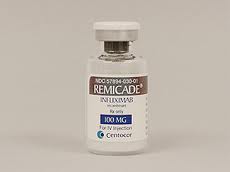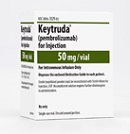 Along with its third-quarter financials, Merck & Co. ($MRK) delivered some more bad news about its Remicade brand: Discounted biosimilar versions are grabbing market share and eroding sales, and that trend isn't going to change.
Along with its third-quarter financials, Merck & Co. ($MRK) delivered some more bad news about its Remicade brand: Discounted biosimilar versions are grabbing market share and eroding sales, and that trend isn't going to change.
With the franchise under attack from biosims sold at prices averaging 30% to 45% off its Remicade brand, market share slid to 90% for the third quarter from 95% just one quarter ago. Sales themselves were down 13% (27% including currency effects) as Merck reportedly cut its own prices to help combat those biosim discounts.
The company says it expects those declines to accelerate in the fourth quarter and through 2016.
Many current patients are sticking with the brand because their disease is well controlled, and doctors don't want to risk switching them over to a biosim, executives said during Tuesday's earnings call with analysts. But new patients are starting on biosims instead, and that's what's eroding share. With 10% to 20% of the Remicade business deriving from new patients, those losses will "continue to have an impact."
Overall, Merck's third-quarter revenue declined to $10.1 billion from $10.6 billion the same period last year, but earnings were up on lower costs, including operating cuts and a big decline in restructuring charges. The company slightly raised its EPS guidance for the year, to $3.55 to $3.65 from $3.45 to $3.55.
Other closely watched drugs fared better than Remicade this period. Its diabetes-fighting Januvia franchise posted increased sales--$1.57 billion versus $1.44 billion last year--partly because of customer buying patterns, the company said. Analysts had been expecting $1.48 billion.
The even better news was that Merck is seeing no sign that patients are switching from Januvia's DPP-4 class to the SGLT2 class, where Eli Lilly & Co. ($LLY) and Boehringer Ingelheim's Jardiance recently proved to reduce cardiovascular risks, an unprecedented feat for a diabetes med. There's been some switching within the SGLT2 class, however, Merck execs said, citing prescription data.
 Meanwhile, Merck's immuno-oncology med Keytruda keeps racking up gains, with $160 million for the quarter, almost $30 million above consensus expectations. The drug won a new indication in non-small cell lung cancer during the third quarter, in patients who test positive for PD-L1 expression and who've failed on a previous regimen, and Merck is waiting on news for another new use in melanoma.
Meanwhile, Merck's immuno-oncology med Keytruda keeps racking up gains, with $160 million for the quarter, almost $30 million above consensus expectations. The drug won a new indication in non-small cell lung cancer during the third quarter, in patients who test positive for PD-L1 expression and who've failed on a previous regimen, and Merck is waiting on news for another new use in melanoma.
- read the Merck release
Special Reports: Top 15 pharma companies by 2014 revenue - Merck | Top 10 pharma companies by employees - Merck